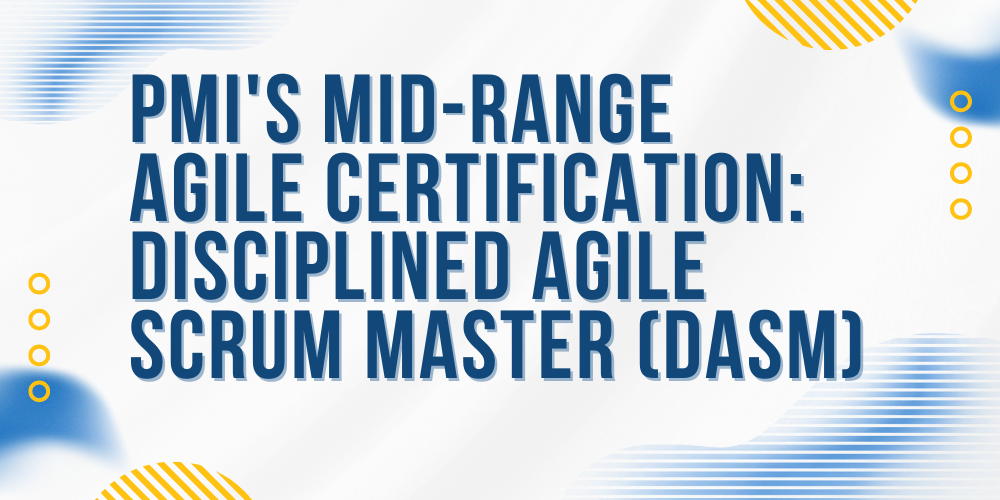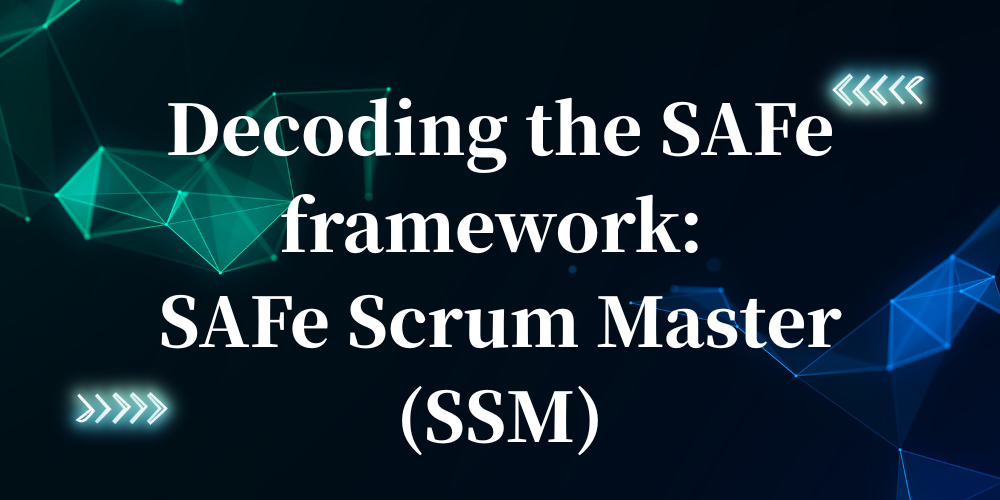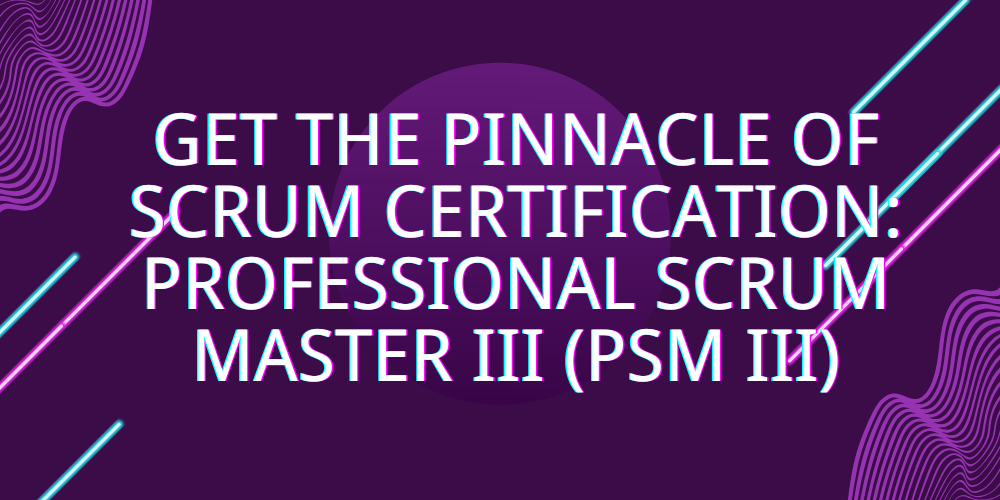TRUSTED BY THE SMARTEST TEAMS IN THE WORLD FOR CERTIFIED CANDIDATES
SPOTO Blogs
Useful learning materials to become certified IT personnel
-
- 531
- SPOTO 2
- 2025-10-24 10:56
-
- 511
- SPOTO 2
- 2025-10-23 15:12
-
- 547
- SPOTO 2
- 2025-10-23 15:08
-
- 503
- SPOTO 2
- 2025-10-22 15:30
-
- 540
- SPOTO 2
- 2025-10-22 15:24
-
- 510
- SPOTO 2
- 2025-10-21 14:52
-
- 508
- SPOTO 2
- 2025-10-21 14:45
-
- 543
- SPOTO 2
- 2025-10-20 15:50
-
- 526
- SPOTO 2
- 2025-10-20 15:37
TRUSTED BY THE SMARTEST TEAMS IN THE WORLD FOR CERTIFIED CANDIDATES
SPOTO Blogs
Useful learning materials to become certified IT personnel
-
- 531
- SPOTO 2
- 2025-10-24 10:56
Table of Contents1. Introduction to the Disciplined Agile Scrum Master certification2. The Competitive Edge of a DASM Certification3. Core Components of the DASM Certification4. What are the requirements to be a DASM?5. Comparable Certifications to Disciplined Agile Scrum Master Certification DASM is a mid-range agile certification launched by PMI that flexibly combines Scrum according to specific scenarios, rather than being limited to a single framework. 1. Introduction to the Disciplined Agile Scrum Master certification The Disciplined Agile Scrum Master (DASM) is an agile certification launched by the Project Management Institute (PMI), belonging to the Disciplined Agile (DA) framework system. It focuses on cultivating professional talents who can flexibly apply Scrum and other agile practices in complex and changing environments, guide teams to deliver value. DASM emphasizes "situational adaptation," which means selecting the most suitable agile method based on factors. It is a mid-range agile certification that balances flexibility and practicality. In practical work, a single agile framework often struggles to handle complex scenarios. The core positioning of DASM certification is to cultivate "contextualized agile practitioners and flexible guides" rather than "executors of a single framework." The certificate holder needs to master the "lean agile thinking" of the DA framework, be able to choose suitable practices from various agile methods such as Scrum, Kanban, XP, etc. according to specific situations, balance "agile flexibility" and "organizational standardization," and ultimately promote efficient team delivery and support organizational level agile capability building. These types of talents usually play the role of "tailors and team enablers of agile practices," balancing method adaptation with business objectives. 2. The Competitive Edge of a DASM Certification DASM is launched by PMI, the world's largest project management organization, which combines PMI's authority in project management with the contextual advantages of DA framework. It is highly recognized in traditional enterprises and is particularly suitable for industries that need to balance "agile innovation" and "compliance management." Compared to pure Scrum certification, DASM provides a "Method Selection Guide" to help practitioners avoid a "one size fits all" approach in complex scenarios, quickly find suitable agile practice combinations, and enhance flexibility in solving practical problems. For traditional project managers, DASM is a smooth path for agile transformation, which can be integrated with PMI's certification system to form a composite capability of "project management + agile practice." By obtaining the DASM certification and joining PMI's agile community, you can access the latest practice cases and tool templates of the DA framework, and communicate with global agile practitioners on complex scenario solutions. 3. Core Components of the DASM Certification DASM certification is based on the Disciplined Agile framework, which constructs a complete capability system covering agile thinking, practical methods. DASM certification breaks through the limitations of a single agile method and focuses on selecting the most suitable combination of agile practices in different business scenarios. The DA framework deeply analyzes the core concept of "agile methods" and masters the art of balancing the three pillars of agile mindset, lean thinking, and governance compliance. Team guidance techniques utilize the team maturity model for diagnosis, mastering comprehensive guidance skills from improving internal team skills to clearing cross departmental obstacles The organizational collaboration mechanism promotes the deep integration of team practice and organizational strategy, ensuring that agile delivery serves the overall goals of the enterprise. Scrum extension application is based on proficiency in standard Scrum practices, learning how to expand role configuration according to team size complexity, optimize event flow, and introduce risk management tools Situational approach selection cultivates the ability to select agile practice combinations based on project characteristics through systematic decision flowcharts, achieving precise matching between methodology and business scenarios. Establish a continuous improvement system that covers delivery cycles, quality indicators, and team satisfaction, and continuously optimize agile practices through data-driven approaches. DASM certification places special emphasis on cultivating your judgment and adaptability in complex environments. It includes in-depth analysis of theoretical frameworks and full process skills from team practice to organizational collaboration, helping you build a comprehensive ability to flexibly apply agile methods in different business scenarios. 4. What are the requirements to be a DASM? (1) Qualification prerequisites: DASM certification does not have strict educational or work experience requirements, but PMI recommends that you have basic knowledge of Agile or Scrum. Certification does not require mandatory training, but PMI recommends attending authorized DASM training courses to systematically master the DA framework and contextualized practice methods. (2) Training and examinations: DASM has a total of 50 multiple-choice questions, with a test duration of 90 minutes. Answering 30 or more questions correctly will result in passing. The individual exam fee is $300 for PMI members or $400 for non members. If attending the training, the cost will increase appropriately. (3) Qualification maintenance: The DASM certificate is valid for 3 years and requires the accumulation of 60 professional development units during the validity period. It can be obtained through participating in agile training, writing articles, and participating in community activities; No renewal fee is required, but PMI membership must be maintained. 5. Comparable Certifications to Disciplined Agile Scrum Master Certification Certified Scrum Master (CSM) Professional Scrum Master I (PSM I) Professional Kanban Foundation (PKF) SAFe 5 Scrum Master (SSM) -
- 511
- SPOTO 2
- 2025-10-23 15:12
Table of Contents1. Introduction to the SAFe Scrum Master certification2. The Competitive Edge of a SAFe Scrum Master Certification 3. Core Components of the SAFe Scrum Master Certification4. What are the requirements to be a SAFe Scrum Master?5. Comparable Certifications to SAFe Scrum Master Certification SAFe Scrum Master (SSM) is a key qualification for an organization's agile transformation, cultivating the ability to lead and scale collaboration within Scrum teams. 1. Introduction to the SAFe Scrum Master certification The SAFe Scrum Master (SSM) is an agile certification developed by Scaled Agile, Inc., focusing on the guidance of Scrum teams and scaled collaboration within the SAFe framework. It aims to cultivate professionals who can proficiently apply the SAFe framework, lead Scrum teams to deliver value efficiently. This certification is suitable for practitioners in mid-to-large organizations adopting the SAFe framework, who are responsible for implementing team-level agile practices. In large enterprises adopting the SAFe framework, the practice of a single Scrum team must be integrated into the organizational-level agile system to achieve a balance between "local efficiency" and "overall alignment." The core of SSM certification is to cultivate "team-level agile enablers and collaborators under the SAFe framework." It not only requires certified individuals to master traditional Scrum practices but also demands proficiency in SAFe's unique large-scale collaboration mechanisms. These professionals help teams achieve rapid iteration and value delivery under enterprise-level objectives while bridging cross-team processes. Such talents balance team internal efficiency with organizational-level coordination. 2. The Competitive Edge of a SAFe Scrum Master Certification SSM is the authoritative certification for team level agile implementation under the SAFe framework. It is highly recognized in large enterprises that adopt SAFe and is the "hard currency" for entering agile positions in such organizations. The SSM certification learning process covers key practices unique to SAFe helps you master the core methods for agile implementation in medium to large organizations and address the pain points of traditional Scrum in large-scale scenarios. According to industry data, SSM holders in companies adopting SAFe earn 25%-40% more than regular Scrum Masters. SSM certified holders can join the SAFe global community to access the latest SAFe practice cases, toolkits, and industry connections, participate in SAFe official events, and continuously follow the forefront trends of scale and agility. 3. Core Components of the SAFe Scrum Master Certification The SSM certification system has built a team level practical capability system under the SAFe scale agile framework, focusing on the deep integration of Scrum methods and scale agile frameworks. SSM certification deeply analyzes the four hierarchical structures and three pillar theories around the SAFe framework basic modules, helping students establish a complete scale agile cognitive system and clarify the positioning and value of Scrum teams in the SAFe environment. The Scrum Team Practice Unit focuses on training teams on collaborative work patterns in ART, including key skills such as PI cycle alignment and built-in quality practices, to ensure that team delivery meets the quality standards of agile scaling. The large-scale collaboration mechanism covers important activities such as PI planning and ART meetings, cultivating students' ability to handle cross team dependencies and risk management, and establishing an end-to-end collaborative perspective. The Scrum Master's responsibilities redefine the role and mission in the SAFe environment, expanding from team guidance to system promotion and cross team collaboration, forming multidimensional service leadership. The Lean Agile Integration module combines traditional Scrum practices with lean thinking and systems thinking, introducing practical tools such as PI target tracking and ROAM risk list to enhance the ability to solve complex problems. SSM certification places special emphasis on cultivating students' adaptability and execution skills in large organizational environments, helping them master key techniques for effectively connecting team level agility with scalable frameworks through real-life cases. It includes both systematic learning of the SAFe framework and full process skill training from team practice to project collaboration, helping you build comprehensive capabilities to drive agile implementation in complex organizational environments. 4. What are the requirements to be a SAFe Scrum Master? (1) Qualification prerequisites: There is no mandatory prerequisite certification requirement for SAFe Scrum Master (SSM) certification, but SAFe recommends that you have a Scrum foundation or at least 1 year of Scrum team practice experience. In addition, you also need to attend the "SAFe Scrum Master" training course authorized by Scaled Agile and obtain a certificate of completion before you can register for the exam. (2) Training and examinations: The SAFe Scrum Master (SSM) exam consists of 45 multiple-choice questions and lasts for 90 minutes. The maximum score for the exam is 100 points, and a score of 70 or above is required to pass. (3) Qualification maintenance: The SAFe Scrum Master (SSM) certificate is valid for one year. During the validity period, you need to accumulate 45 Professional Development Units (PDUs) and pay a renewal fee of approximately $100 per year by participating in Scaled Agile officially recognized continuing education activities. You must also sign the SAFe Code of Conduct and continue to practice the SAFe values. 5. Comparable Certifications to SAFe Scrum Master Certification Scaled Scrum Professional Certification (SSPC) Scaled Professional Scrum (SPS) SAFe Advanced Scrum Master (SASM) International Consortium for Agile (ICAgile) Certified Professional in Agile Coaching (ICP-ACC) -
- 547
- SPOTO 2
- 2025-10-23 15:08
Table of Contents1. Introduction to the PSM III certification2. Career Value of Holding the PSM III Certification3. Core Components of the Professional Scrum Master III Certification4. What are the requirements to be a PSM III?5. Comparable Certifications to Professional Scrum Master III Certification PSM III is the pinnacle of the Scrum certification system, which aims to cultivate agile strategic experts with systemic thinking and organizational change leadership. 1. Introduction to the PSM III certification Professional Scrum Master III (PSM III) is the highest level certification in the Scrum certification system launched by Scrum.org, focusing on verifying your Scrum deep practice ability, coaching leadership, and organizational level agile change driving ability in extremely complex scenarios. It requires you not only to be a "master" of the Scrum framework, but also a "strategic expert" who can diagnose and solve the core pain points of organizational agile transformation and shape agile culture. It is one of the most valuable authoritative qualifications in the Scrum field. When enterprises face extreme challenges such as large-scale agile transformation resistance, complex cross departmental collaboration deadlock, and agile adaptation under high compliance requirements, ordinary Scrum Masters find it difficult to break through the limitations of the "team level." The core of PSM III certification is to cultivate "agile strategic experts with systems thinking and change leadership," rather than simply process guides. The certificate holder needs to be like an "organizational agile doctor," diagnosing the deep problems of organizational agile transformation from a strategic perspective, promoting systematic organizational change through coach style intervention and influence building, and designing sustainable Scrum practice systems for multiple teams, or even the entire organization. These types of talents usually play the role of "leaders of organizational agile transformation," balancing short-term business goals with long-term agile capability building. 2. Career Value of Holding the PSM III Certification PSM III is the "crown level" certification in the Scrum field, issued by Scrum.org, founded by Scrum founder Ken Schwaber. With less than 10000 global holders, it is highly recognized among multinational corporations and is the core symbol of "expert level" identity in the Agile field. Compared to PSM II or other agile certifications, PSM III holders almost monopolize top positions such as "Agile Director" and "Enterprise Transformation Leader." The high difficulty exams and strict practical requirements ensure that you can handle extreme scenarios that ordinary Scrum Masters cannot solve, becoming the "core think tank" for enterprise agile transformation. Having PSM III certification allows one to join Scrum.org's "PSM III Elite Community" and directly connect with top Scrum experts worldwide, participate in closed door seminars. 3. Core Components of the Professional Scrum Master III Certification PSM III certification, as the highest professional level certification in the Scrum field, marks the leap of practitioners from practitioners to leaders of organizational change. The PSM III certification system breaks through the traditional Scrum process framework, achieving a clear understanding of the essence and philosophy of the framework through empirical and complex adaptive system theory. It can design customized Scrum systems for complex scenarios to achievie precise adaptation of the framework to business characteristics. Organizational transformation architecture design identifies and breaks through fundamental barriers such as functional barriers and assessment conflicts, develops a transformation roadmap from pilot teams to the entire organization's agile culture, and promotes the restructuring of organizational structure and processes. The ability to make complex risk decisions in extreme scenarios such as distributed teams and large-scale dependencies, using systems thinking tools to analyze risk transmission paths and establish a forward-looking risk management system. Agile culture shapes the implementation mechanism of design values and the construction plan of psychological safety environment, elevating agility from process methods to organizational culture. Inheriting and cultivating an internal coaching team, building a replicable knowledge management system, and ensuring the continuous evolution of organizational capabilities. PSM III certification places special emphasis on cultivating students' systematic thinking and change driving abilities at the strategic level. A complete system covering philosophical theories and practical tools, providing students with comprehensive solutions to address the complex challenges of modern enterprises. 4. What are the requirements to be a PSM III? (1) Qualification prerequisites: You need to first obtain the Professional Scrum Master II (PSM II) certification and have a solid foundation in mid to high-level Scrum practices. Scrum.org recommends that you have at least 3 years of Scrum Master practical experience and have participated in at least 1 complete organizational level agile transformation project, experiencing problem-solving in complex scenarios. Scrum.org does not have mandatory training requirements, but we strongly recommend that you participate in advanced specialized training taught by a Professional Scrum Trainer (PST), focusing on complex scenario case analysis and coaching skills polishing. (2) Training and examinations: The Professional Scrum Master III exam consists of 30 situational analysis questions, with a focus on "complex problem diagnosis and solution design." The exam lasts 120 minutes longer than PSM II and requires a thorough analysis of complex scenarios. A perfect score of 100 is required to achieve a score of 90 or above to pass. The global pass rate is only about 10%-15%, making it one of the most difficult exams in Scrum certification. The exam fee is approximately $500. It is particularly important to note that scoring not only tests the correctness of answers, but also emphasizes the "logicality of solutions, degree of adherence to Scrum principles, and flexibility in dealing with complex scenarios." Open ended questions need to clearly explain the decision-making basis. (3) Qualification maintenance: The Professional Scrum Master III certificate is valid for life and does not require renewal, but Scrum.org encourages holders to maintain their learning by participating in Scrum.org's "Professional Scrum Contributor" program, sharing practical cases or writing professional articles, or serving as Scrum.org community instructors or teaching assistants in certification training courses. 5. Comparable Certifications to Professional Scrum Master III Certification Advanced Certified Scrum Master - Level 3 (A-CSM 3) SAFe Program Consultant 6.0 (SPC 6.0) Certified Enterprise Coach (CEC) -
- 503
- SPOTO 2
- 2025-10-22 15:30
Table of Contents1. Introduction to the Registered ScrumMaster certification2. The Competitive Edge of a RSM Certification 3. Core Components of the Registered ScrumMaster Certification4. What are the requirements to be a registered ScrumMaster?5. Comparable Certifications to Registered ScrumMaster Certification Registered ScrumMaster is an entry-level agile certification endorsed by the founder that focuses on the precise implementation of Scrum practices and team empowerment. 1. Introduction to the Registered ScrumMaster certification Registered ScrumMaster (RSM) is an entry-level agile certification launched by Scrum Inc., focusing on the practical implementation of the Scrum framework and team guidance capabilities. It aims to cultivate professional talents who can proficiently apply Scrum core practices, remove team barriers, and promote efficient value delivery. It is one of the authoritative entry-level qualifications for entering the Scrum field. In the enterprise environment of accelerated agile transformation, teams need mentors who understand both the Scrum process and can flexibly implement it. The core of RSM certification is to cultivate "precise executors and team enablers of Scrum practices," emphasizing the original ideas of Scrum founders, helping teams break free from traditional management constraints, and achieving rapid iteration and value delivery through standardized execution of Scrum events and optimized collaboration processes. These types of talents usually play the role of "team efficiency catalysts" and need to focus on solving practical problems. 2. The Competitive Edge of a RSM Certification RSM is awarded by Scrum Inc., founded by Scrum founder Jeff Sutherland. The certification content adheres to the original Scrum philosophy and is highly recognized in enterprises that emphasize "orthodox Scrum practices." Training and exams focus on "practical skills" rather than pure theory, and can be directly applied to team management after learning, optimizing Scrum event processes, solving practical obstacles, and suitable for practitioners who focus on practical results. As an entry-level certification in the Scrum field, RSM is an important qualification for job seekers seeking entry-level ScrumMaster positions. With RSM certification, you can join the Scrum Inc. global community, access Jeff Sutherland's latest practical cases, participate in official online seminars, and directly learn from the founder's cutting-edge experience. 3. Core Components of the Registered ScrumMaster Certification RSM certification deeply inherits the practical essence of Scrum founder Jeff Sutherland and constructs a complete certification system from theory to practice. The RSM certification focuses on the in-depth analysis of Scrum core theoretical modules and the original framework design concepts, emphasizing the practical application of empiricism in iterative feedback and helping learners understand the inherent logical relationship between values and framework components. The Role Based Collaborative Unit trains the collaborative mechanisms of the three main roles through real-life scenarios, with a focus on developing the Scrum Master's ability to clear obstacles, the Product Owner's ability to make value decisions, and the development team's self-organizing ability. The efficient execution phase of events provides specific and feasible optimization solutions for the five major events that are easy to formalize in daily practice, including user story decomposition methods, station meeting time control techniques, and retrospective guidance techniques based on Scrum Inc.'s official tools. The obstacle recognition and removal module system sorts out common organizational and technical obstacles in practice, and provides data-driven improvement methods to continuously optimize team effectiveness through key indicators such as delivery rate and obstacle resolution time. The practical tool application section combines mainstream tools such as Jira to demonstrate how to effectively monitor project progress through visualization methods such as burndown charts, ensuring that Scrum practices are measurable and optimizable. RSM certification places special emphasis on transforming the founder's original ideas into practical skills that can be implemented, using real-life cases to help students grasp the essence of the framework rather than the surface process. It includes both the core interpretation of Scrum theory and the full process optimization plan from planning to review, helping you maintain the accuracy and effectiveness of Scrum implementation in complex work environments. For practitioners who wish to learn orthodox Scrum and quickly get started with agile management, RSM certification is an authoritative and practical choice that can gain industry recognition and master directly applicable team management skills. 4. What are the requirements to be a registered ScrumMaster? (1) Qualification prerequisites: There are no strict educational or work experience requirements for RSM certification, which is suitable for beginners with zero foundation. Before the exam, you need to attend an official RSM training course authorized by Scrum Inc., taught by a certified Scrum trainer. After completing the training and obtaining a certificate of completion, you can register for the exam. (2) Training and examinations: The RSM certification consists of 50 multiple-choice questions, with a test duration of 60 minutes. Answer 70% or more correctly to pass, with a focus on practical application scenarios. (3) Qualification maintenance: The RSM certificate is valid for 2 years and requires the accumulation of 16 Scrum Education Credits by participating in Scrum Inc. recognized continuing education activities and advanced training during the validity period, and timely payment of the renewal fee of approximately $100 per 2 years. 5. Comparable Certifications to Registered ScrumMaster Certification Certified ScrumMaster (CSM) Professional Scrum Master (PSM) Disciplined Agile Scrum Master (DASM) ICAgile Certified Professional (ICP) -
- 540
- SPOTO 2
- 2025-10-22 15:24
Table of Contents1. Introduction to the Professional Scrum Master II certification2. The Competitive Edge of a PSM II Certification 3. Core Components of the Professional Scrum Master II Certification4. What are the requirements to be a Professional Scrum Master II?5. Comparable Certifications to Professional Scrum Master II Certification Professional Scrum Master II is an advanced certification in the Scrum field that focuses on in-depth practice and coaching facilitation capabilities in complex scenarios. 1. Introduction to the Professional Scrum Master II certification Professional Scrum Master II (PSM II) is an advanced Scrum certification launched by Scrum.org, which is an upgraded version of PSM I. It focuses on verifying your deep practical skills and coaching guidance ability in applying the Scrum framework in complex scenarios. It requires you to not only master the core principles of Scrum, but also be able to flexibly respond to team growth obstacles and promote the effective implementation of Scrum at the team and organizational levels. It is a key certification for advancing from a "basic practitioner" to a "senior guide." As Scrum teams move from "entry-level" to "mature," they will face more complex challenges such as insufficient team self-organization ability, inefficient cross departmental collaboration, management's misunderstanding of agile, and dynamic imbalance between requirements and resources. The core positioning of PSM II certification is to cultivate "coaching talents who can diagnose and solve complex Scrum problems," rather than simply being process executors. The certificate holder needs to act like a "doctor" by observing team behavior, analyzing collaboration patterns, accurately identifying deep problems in Scrum implementation, and using coaching skills to guide the team to independently solve them, while promoting the optimization of the organizational environment towards supporting Scrum. These types of talents usually play the role of "team catalysts and organizational change drivers," balancing team health and business goals. 2. The Competitive Edge of a PSM II Certification PSM II is a widely recognized "proof of seniority" in the Scrum field, and its high difficulty exam ensures that you have the practical ability to solve complex problems. It is the core screening criteria for positions such as "Senior Scrum Master" and "Agile Coach" in recruitment. According to industry data, the average annual salary of PSM II holders is 30%-40% higher than that of PSM I holders. The PSM II certification learning process cultivates the analytical ability to "see the essence through phenomena" and helps practitioners shift from passive problem-solving to proactive problem prevention. After obtaining the certificate, you can join the advanced community of Scrum.org, access the world's top Scrum practice cases and expert resources, participate in industry sharing, and enhance your personal brand influence. 3. Core Components of the Professional Scrum Master II Certification PSM II certification, as an advanced certification for Scrum professionals, focuses on the deep cultivation of agile practice skills and coaching leadership in complex scenarios. On the basis of PSM I, PSM II certification has built five core competency systems, with deep application modules that go beyond the mechanical execution of standard processes, cultivating the ability to flexibly adjust practices according to team size, distribution characteristics, and industry characteristics, mastering the integration of Scrum with XP, Kanban and other methods, and solving complex problems such as quality assurance under high-frequency changes. Team empowerment guidance involves diagnosing self-organizing disorders, using coaching techniques such as active listening and powerful questioning to help the team establish independent improvement capabilities, and achieving a transition from "management" to "stimulation." Organizational change drives the focus on identifying and removing organizational level barriers, presenting agile value through dataization, optimizing performance evaluation systems and reengineering collaborative processes, and building an environment that supports self-organizing teams. Complex risk management targets fuzzy requirements and rapidly changing scenarios, introducing advanced practices. An efficient collaboration mechanism enhances the value decision-making ability of product owners, optimizes stakeholder collaboration models, and ensures maximum collaboration efficiency within and outside the team. PSM II certification places special emphasis on cultivating students' judgment and adaptability in real business environments. Through case analysis and practical tools, it helps you grow from a standard executor to an agile coach capable of handling complex challenges. The certification covers real-world scenarios such as large-scale teams, distributed collaboration, and strong compliance environments, providing students with a systematic framework for problem diagnosis and resolution. 4. What are the requirements to be a Professional Scrum Master II? (1) Qualification prerequisites: The prerequisite for obtaining PSM II is that you first obtain the Professional Scrum Master I (PSM I) certification and have a solid foundation in Scrum. Scrum.org recommends that you have 1-2 years of practical Scrum Master experience, have participated in at least 1-2 complete Scrum project cycles, and have experienced typical challenges of team growth. PSM II does not require mandatory training, but Scrum.org strongly recommends attending advanced training taught by a Professional Scrum Trainer (PST) to deepen the ability to cope with complex scenarios. (2) Training and examinations: The PSM II exam consists of 30 multiple-choice questions and lasts for 90 minutes. A maximum score of 100 is required, with a minimum score of 85 to pass. The difficulty level is significantly higher than PSM I, with a focus on analyzing and making decisions in complex scenarios. The exam fee is approximately $250 (3) Qualification maintenance: But the good news is that the PSM II certificate is valid for life and does not require renewal, but Scrum.org encourages holders to deepen their professional skills through continuous practice, participation in community activities, or taking the PSM III exam. 5. Comparable Certifications to Professional Scrum Master II Certification PMI Agile Certified Practitioner (PMI-ACP) Professional Scrum Product Owner II (PSPO II) Advanced Certified Scrum Master (A-CSM) SAFe Scrum Master (SSM) -
- 510
- SPOTO 2
- 2025-10-21 14:52
Table of Contents1. Introduction to the PSM I certification2. The Competitive Edge of a PSM I Certification3. Core Components of the PSM I Certification4. What are the requirements to be a Professional Scrum Master I?5. Comparable Certifications to Professional Scrum Master I Certification Professional Scrum Master I (PSM I) is an entry-level certification in the agile field endorsed by the Scrum founding team, focusing on "deep understanding and flexible application." 1. Introduction to the PSM I certification Professional Scrum Master I is an entry-level certification in the agile field endorsed by the Scrum founding team, focusing on "deep understanding and flexible application." Professional Scrum Master I (PSM I) is an entry-level Scrum certification launched by Scrum.org, focusing on a deep understanding and flexible application of the core theories, practical principles, and application scenarios of the Scrum framework. Its aim is to verify the ability of practitioners as Scrum Masters to guide teams in practicing Scrum values, standardizing the execution of Scrum events and artifacts, and effectively solving common problems in practice. It is a highly recognized entry-level certification in the agile field. In modern project management that emphasizes rapid response to change and continuous delivery of value, the standardized implementation of the Scrum framework relies on a deep understanding of its underlying logic. The core positioning of PSM I certification is to cultivate Scrum practitioners who understand principles and are able to implement them, rather than just "process managers" who master process forms. You need to have a deep understanding of the theoretical foundation of Scrum, be able to flexibly apply the Scrum framework according to the actual situation of the team rather than mechanically applying processes, and ultimately help the team achieve self-organization, cross functional collaboration, and improve delivery efficiency and product quality. These types of talents usually play the role of "coaches and consultants" for the team, and need to solve complex scenario problems based on their understanding of Scrum principles. 2. The Competitive Edge of a PSM I Certification Scrum.org was founded by Ken Schwaber, the founder of Scrum. The PSM certification series is known for its emphasis on principles and practice, and is highly recognized among global technology companies and domestic giants. It is a core reference for agile job recruitment. The PSM I exam has a low pass rate and focuses on understanding the principles, making it easier for holders to be recognized as professionals who truly understand Scrum. Compared to certification that focuses solely on processes, the "principle-based" abilities cultivated by PSM I are applicable to a wider range of scenarios, laying the foundation for advanced Scrum Masters or Agile coaches. And the most noteworthy thing is that PSM I certification does not require mandatory training and can be self studied and prepared through free resources, suitable for practitioners with limited budgets but who hope to improve their systems. 3. Core Components of the PSM I Certification PSM I certification deeply analyzes the core essence and practical essence of Scrum framework, focusing on cultivating students' profound understanding of agile principles rather than mechanical memory. The PSM I certification system is built around five core modules. The Scrum foundational theory module starts from empiricism and complex adaptive system theory, explaining the practical significance of the three pillars and systematically explaining the implementation methods of the five values. The role responsibility boundary precisely defines the triple responsibilities of Scrum Master service-oriented leadership, clarifies the core mission of the Product Owner to be responsible for product value, and emphasizes the key requirements of development team self-organization and cross functional collaboration. In depth analysis of the design principles of each Scrum event, from the invariance principle of the sprint's fixed time box to the developer led feature of daily station meetings, reveals how events collaborate to achieve a continuous improvement cycle. The logic of workpiece management focuses on explaining the dynamic characteristics and clarity standards of product to-do lists, analyzing the essence of sprint to-do lists as team commitments, and emphasizing that increments must meet the quality requirements of the "definition of completion." Provide solutions to practical challenges such as requirement changes, estimation deviations, and cross departmental collaboration, help identify and correct the phenomenon of "pseudo agility"; and guide teams to return to the essence of Scrum. PSM I certification emphasizes a deep understanding of the principles of Scrum framework, helps students master the ability to cope with complex work environments through scenario based teaching, and focuses on cultivating students' judgment and adaptability in real scenarios, rather than simply applying templates. 4. What are the requirements to be a Professional Scrum Master I? (1) Qualification prerequisites: PSM I certification does not require mandatory training or work experience, making it suitable for all practitioners who wish to systematically learn Scrum. (2) Training and examinations: The PSM I question type includes 80 multiple-choice questions, with a test duration of 60 minutes and a maximum score of 100. Only those who score 85 or above can pass. The difficulty level is higher than that of similar entry-level certifications, and the exam fee is approximately $150. (3) Qualification maintenance: The PSM I certificate is valid for life and does not require renewal, but Scrum.org encourages holders to continue learning and deepen their abilities through practice or advanced certification. 5. Comparable Certifications to Professional Scrum Master I Certification Certified Scrum Master (CSM) PMI - Agile Certified Practitioner (PMI - ACP) EXIN Agile Scrum Master -
- 508
- SPOTO 2
- 2025-10-21 14:45
Table of Contents1. Introduction to the Scaled Professional Scrum certification2. The Rewards of Being a Scaled Professional Scrum3. Core Components of the Scaled Professional Scrum Certification4. What are the requirements to be a Scaled Professional Scrum?5. Comparable Certifications to Scaled Professional Scrum Certification Scaled Professional Scrum is an advanced certification for large-scale Scrum practices, focusing on multi-team collaboration and the ability to promote agile transformation. 1. Introduction to the Scaled Professional Scrum certification Scaled Professional Scrum (SPS) is an advanced certification launched by Scrum.org, focusing on the validation of the ability to scale the application of the Scrum framework in large organizations or complex projects. For practitioners who wish to delve deeper into the agile field in large enterprises or complex projects, SPS certification is not only an authoritative endorsement of their abilities, but also an important ladder to break through career ceilings and participate in high-value transformation projects. It is recommended that after accumulating practical experience in single team Scrum, training and practical case analysis be conducted to prepare for the exam and improve application skills. It is based on the core principles of Scrum and aims to cultivate professionals who can design and guide large-scale Scrum practices for scenarios such as multi team collaboration and cross departmental alignment. It is suitable for managers, architects, or senior Scrum Masters who need to coordinate multiple Scrum teams to achieve large-scale product delivery. When a company needs to collaborate with multiple Scrum teams to deliver complex products, the Scrum practice of a single team is difficult to address challenges such as inter team dependencies, goal alignment, and resource coordination. The core of SPS certification is to cultivate "designers and drivers of scaled Scrum," help organizations break down team barriers, establish cross team collaboration mechanisms, ensure efficient collaboration among multiple Scrum teams around a common product vision, and achieve scaled delivery of value. These types of talents usually play the role of "bridges" in organizational level agile transformation, balancing local team efficiency with overall product goals. 2. The Rewards of Being a Scaled Professional Scrum SPS certification focuses on the most challenging issue of "multi team collaboration" in practical situations. Having SPS certification can be recognized by enterprises as an expert with the ability to implement from "single team agility" to "organizational level agility," especially in large enterprises where demand is high. Compared to practitioners who only master single team Scrum, SPS holders are more likely to be promoted to senior management positions. The training and examination process covers Scrum@Scale. The practical points of mainstream frameworks help you break away from "empiricism" and master replicable methods for large-scale design. Having SPS certification also allows one to join Scrum.org's SPS community, access global scale practice cases, participate in high-end forums, connect with experts in the same field, and provide reference ideas for complex projects. 3. Core Components of the Scaled Professional Scrum Certification SPS certification focuses on the application and extension of Scrum framework in large-scale environments, aiming to address complexity issues in multi team collaboration. In depth analysis of the SPS certification system around the principle of scale and framework modules Scrum@Scale. The core components of mainstream extension frameworks such as LeSS emphasize achieving multi team collaboration through transparency, alignment, and synchronization mechanisms, avoiding the introduction of unnecessary management hierarchies. The multi team collaboration mechanism focuses on training product goal decomposition skills, achieving strategic alignment through quarterly OKRs and other tools, and effectively managing technical and resource dependencies between teams using visualization methods such as dependency maps. The organizational empowerment system cultivates the ability to identify and remove organizational level barriers, including breaking down departmental barriers, optimizing traditional processes, adjusting assessment mechanisms, and promoting the transformation of the organization towards a product oriented team architecture. Role expansion and collaboration redefine the responsibilities of each role in a scaled scenario, covering the coordination ability of cross team Scrum Masters, the division of labor and collaboration mode of Product Owner teams, and the transition of management from directive to empowering. Establish a cross team unified quality standard and a sound risk management mechanism for the quality and risk control system, ensuring the stability and reliability of large-scale delivery. SPS certification includes in-depth analysis of large-scale frameworks and practical experience throughout the entire process from strategic alignment to execution. 4. What are the requirements to be a Scaled Professional Scrum? (1) Qualification prerequisites: The prerequisite for obtaining SPS certification is to obtain Professional Scrum Master I (PSM I) certification and have a solid foundation in Scrum. Scrum recommends that you have at least one year of experience in multi team collaboration or large-scale projects, and understand the challenges of scaling scenarios. You need to participate in the "SPS Certification Training" authorized by Scrum.org, which focuses on practical cases and interactive exercises. (2) Training and examinations: The SPS certification consists of 40 multiple-choice questions, with a test duration of 60 minutes and a maximum score of 100 points. Only those who score 85 or above can pass. (3) Qualification maintenance: The SPS certificate is valid for life and does not require renewal, but Scrum.org encourages holders to deepen their scalability skills through practical or advanced learning. 5. Comparable Certifications to Scaled Professional Scrum Certification Certified Scrum Professional - Scrum Master (CSP-SM) Scrum@Scale Practitioner Professional Scrum Master III (PSM III) Scaled Scrum Professional Certification (SSPC) -
- 543
- SPOTO 2
- 2025-10-20 15:50
Table of Contents1. Introduction to the VCP-TKO certification2. The Competitive Edge of a VCP-TKO Certification3. Core Components of the VCP-TKO Certification4. What are the requirements to be a VMware Certified Professional—Tanzu for Kubernetes Operation?5. Comparable Certifications to VMware Certified Professional - Tanzu for Kubernetes Operation Certification VCP-TKO is an intermediate-level certification in enterprise-level cloud-native operations and maintenance, focusing on the VMware Tanzu platform and Kubernetes clusters. 1. Introduction to the VCP-TKO certification VMware Certified Professional - Tanzu for Kubernetes Operations (VCP-TKO) is an intermediate technical certification launched by VMware, focusing on the validation of Kubernetes operation and maintenance capabilities in the cloud native field. With VMware Tanzu series products as the technical core, it aims to assess your professional ability to automate Kubernetes clusters based on the Tanzu platform. It is suitable for technical personnel responsible for building enterprise cloud native infrastructure and Kubernetes operation and maintenance. In the context of the comprehensive penetration of cloud native technology into enterprise IT architecture, Kubernetes has become the de facto standard for container orchestration, and VMware Tanzu, as an enterprise level cloud native platform, provides a smooth transition solution for traditional VMware users to Kubernetes. The core of VCP-TKO certification is to cultivate professional talents who are proficient in enterprise level Kubernetes operation and governance. They can build stable, secure, and scalable Kubernetes infrastructure based on the Tanzu platform, and solve the problems faced by enterprises in cloud native transformation, such as complex Kubernetes cluster management, low operation efficiency, and difficult implementation of security compliance. These types of talents usually play the role of "operation and maintenance experts and governance executors" in enterprise cloud native infrastructure, and need to connect traditional virtualization and cloud native technology stacks. 2. The Competitive Edge of a VCP-TKO Certification VCP-TKO is a core intermediate certification in the VMware cloud native field, relying on VMware's influence in enterprise IT and highly recognized in industries such as finance. It is the "hard currency" for cloud native operations positions. The VCP-TKO certification learning process covers the entire process of enterprise level Kubernetes deployment and governance, which can systematically enhance the ability to solve complex scenario problems and lay the foundation for the transformation to cloud native architects. By owning VCP-TKO, you can join the VMware cloud native technology community, which helps you obtain official technical documentation, prioritize product testing, connect with industry experts and peer resources, and keep up with the forefront of cloud native technology in a timely manner. 3. Core Components of the VCP-TKO Certification The VCP-TKO certification system has built a complete capability system for enterprise level Kubernetes management on the VMware Tanzu platform, covering the entire lifecycle management from cluster deployment to automated operations and maintenance. VCP-TKO certification revolves around five core modules. The Tanzu platform architecture and Kubernetes core deeply analyze the collaborative logic of the Tanzu product ecosystem, clarify the differentiated characteristics between enterprise level Kubernetes and open source versions, and establish a complete cloud native technology cognitive framework. The cluster deployment and configuration module cultivates cross environment deployment capabilities, implements cluster construction from local HANA to multi cloud platforms through TKG tools, and is proficient in key technologies such as network plugin integration and persistent storage configuration. The operation and maintenance monitoring system covers daily operations such as node management and cluster upgrades. Combined with monitoring tools such as Wavefront, a complete observability system is established to ensure the stable operation of the cluster. The security governance unit constructs a defense in depth security system through RBAC permission control, Tanzu Guardrails compliance policy, and mirror security scanning, meeting enterprise level security requirements. The automated management process utilizes Tanzu Mission Control to achieve unified management of multiple clusters, combined with the GitOps toolchain to achieve a modern operation and maintenance mode of "configuration as code." VCP-TKO places special emphasis on cultivating your practical skills in multi cloud environments, and through systematic courses, helps you master the construction and management of enterprise level Kubernetes platforms. It includes in-depth analysis of the Tanzu ecosystem and full process practice from planning to operation, helping engineers build modern containerized infrastructure management capabilities. 4. What are the requirements to be a VMware Certified Professional—Tanzu for Kubernetes Operation? (1) Qualification prerequisites: If you want to obtain VCP-TKO, you need to first pass the VMware entry-level certification and have knowledge of virtualization or cloud infrastructure. Prior to this, you also need to attend the "Tanzu for Kubernetes Operations" training course authorized by VMware and obtain a certificate of completion. In terms of work experience, VMware recommends that you have 6-12 months of Kubernetes operation and maintenance experience, as well as practical deployment and operation experience on the Tanzu platform. (2) Training and examinations: The VCP-TKO exam code is 2V0-72.22, and the exam content includes multiple-choice questions and situational analysis questions. The exam lasts for 130 minutes, with a total of about 70 questions. Passing the standard score is 500 points, and reaching 300 points or above is enough to pass. The exam fee for VCP-TKO certification is approximately $250. (3) Qualification maintenance: The VCP-TKO certificate is valid for 3 years, and you need to obtain higher-level VMware cloud native certification or participate in VMware officially recognized cloud native within the validity period to accumulate enough credits. 5. Comparable Certifications to VMware Certified Professional - Tanzu for Kubernetes Operation Certification Certified Kubernetes Administrator (CKA) Certified Kubernetes Security Specialist (CKS) Certified Kubernetes Application Developer (CKAD) AWS Certified DevOps Engineer – Professional -
- 526
- SPOTO 2
- 2025-10-20 15:37
Table of Contents1. Introduction to the CSM-001 certification2. Why Earn Your CSM-001 Certification?3. Overview of the CSM-001 Certification4. What are the requirements to be a CSM-001?5. Comparable Certifications to CSM-001 Certification For those who want to transform into agile management or enter the agile field, CSM-001 certification is an excellent choice for quickly building professional knowledge. 1. Introduction to the CSM-001 certification Certified Scrum Master (CSM-001) is an entry-level agile project management certification launched by the Scrum Alliance. It focuses on the practical application of the Scrum framework and the validation of team leadership capabilities, aiming to cultivate professional talents who can proficiently master the core values of Scrum, effectively guide Scrum teams to collaborate efficiently, and deliver value. It is the core entry-level certification for entering the field of agile project management. In the rapidly changing market environment, traditional waterfall project management is no longer able to meet the needs of enterprises for rapid iteration and value first. Scrum, as the most mainstream agile framework, is widely used in software development, product development, and other fields. The core of CSM-001 certification is to cultivate the "leaders and enablers" of Scrum teams, rather than the traditional "managers." The holder is required to practice the Scrum values, coordinate team resources, remove collaboration barriers, ensure the standardized implementation of Scrum events, and help the team efficiently deliver high-quality products. These types of talents usually play the role of a "bridge" between the team and the external environment, balancing business needs and team capabilities. 2. Why Earn Your CSM-001 Certification? CSM-001 is one of the most popular agile entry certifications in the world. The authority of Scrum Alliance is highly recognized in IT, Internet, finance and other industries. It is the core highlight of the job application resume and can quickly gain recognition of the basic agile capabilities of enterprises. For traditional project managers or zero foundation practitioners, CSM-001 is the "passport" to enter the agile field. In the recruitment of entry-level Scrum Master positions in China, CSM certification is one of the most common mandatory requirements, with salaries generally 15%-20% higher than traditional project coordination positions. The training and examination process focuses on practical experience, enabling quick mastery of Scrum's core tools and methods, which can be directly applied to team management or collaboration after completion After obtaining CSM-001 certification, you can join the Scrum Alliance global community to access the latest agile practice cases, participate in online and offline communication activities, expand your industry network, and lay the foundation for further advancement. 3. Overview of the CSM-001 Certification The CSM-001 certification system establishes a complete knowledge framework for Scrum agile practices and thinking patterns, covering core competencies from theoretical foundations to practical applications. The CSM-001 certification revolves around six key modules, with Scrum Fundamentals and Agile Thinking modules providing in-depth analysis of the Agile Manifesto and core values, helping students establish the correct Agile thinking patterns and master the judgment criteria for Scrum's applicable scenarios. The role responsibility system precisely defines the responsibility boundaries and collaboration mechanisms of the three core roles of product owner, Scrum Master, and development team, cultivating team collaboration efficiency. The five major event management systems explain the practical points of the entire process from sprint planning to retrospective meetings, ensuring that students can efficiently organize various activities during the iteration cycle. The core skills of prioritizing product to-do lists, breaking down sprint tasks, and delivering incremental results in the management of three major workpieces are trained, and a measurable value delivery system is established. The obstacle removal and team empowerment module cultivates the ability to identify and solve practical obstacles, and promotes continuous improvement of the team through professional guidance skills. The practical problem-solving unit provides solutions to common challenges and expands Scrum adaptation methods for large and distributed teams. It includes in-depth analysis of fundamental theories and comprehensive practical guidance from planning to review, helping you build a complete Scrum implementation capability. 4. What are the requirements to be a CSM-001? (1) Qualification prerequisites: There are no strict educational or work experience requirements for obtaining CSM-001 certification, which is suitable for practitioners with zero foundation who want to get started with Agile or Scrum. You need to attend the official CSM training course authorized by Scrum Alliance, taught by certified Scrum trainers. (2) Training and examinations: The CSM-001 question type consists of 50 multiple-choice questions, with a test duration of 60 minutes. You can pass by answering 37 or more questions correctly. The exam can be repeated and the first time is free. Subsequent retakes will incur a fee of approximately $25 each. (3) Qualification maintenance: The CSM-001 certificate is valid for 2 years, during which you can earn credits by accumulating 20 Scrum education units, participating in agile training, reading professional books, and participating in Scrum community activities. By the way, the renewal fee is approximately $100 per 2 years. 5. Comparable Certifications to CSM-001 Certification Professional Scrum Master (PSM) Disciplined Agile Scrum Master (DASM) PMI Agile Certified Practitioner (PMI-ACP) Registered ScrumMaster (RSM)














